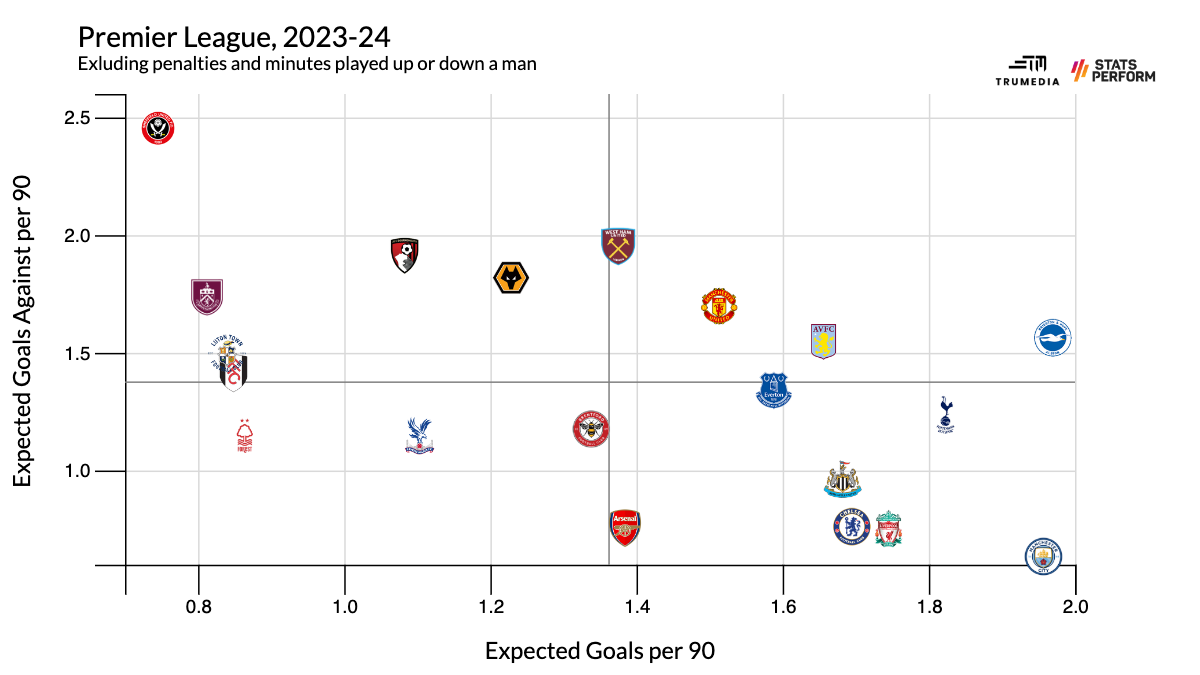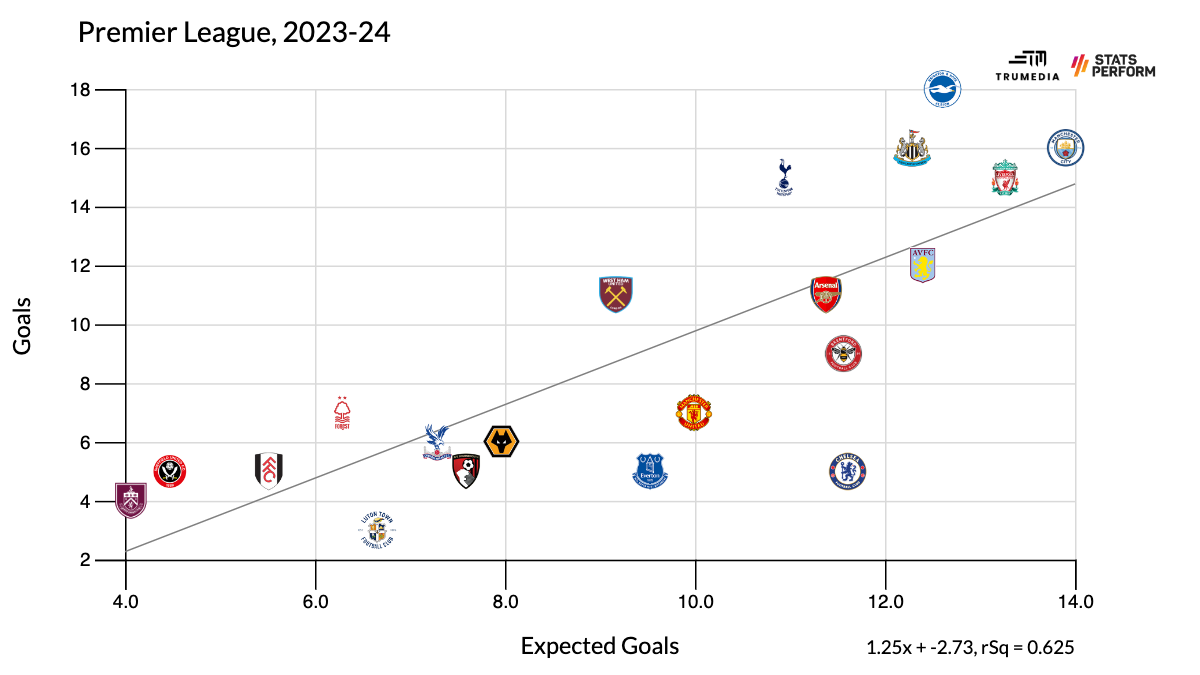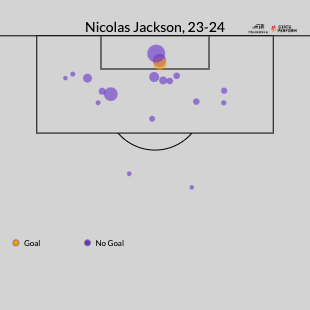Let's start with two facts about Chelsea:
- In 2023, Chelsea have spent more than $800 million on transfer fees. That's more than twice as much as any other team in the Premier League.
- In 2023, Chelsea have won 0.86 points per game in the Premier League -- fewer than any other ever-present team in the Premier League.
Under its new ownership, Chelsea have spent an absurd amount of money on acquiring new players. And under its new ownership, Chelsea have been about as bad as you can be without getting relegated. That's the top-line story.
Except, well, Chelsea haven't really been that bad this season.
Under new manager Mauricio Pochettino, they're doing many of the things that usually lead to winning: creating lots of chances, only conceding a few, dominating field territory, and pressing both aggressively and effectively. However, it hasn't led to results because soccer is fickle, and performance often doesn't translate to points over a six-game stretch.
Normally, you'd preach patience in Poch. The points will come, and everything will eventually be OK. To achieve long-term success in soccer, you need to be able to ride out the inevitable random rough patches without overreacting and tearing down something that was bound to start working again. But because of the hole the club has dug itself into -- both on and off the field -- Chelsea might not even be able to wait it out.
The table is lying
The Premier League table looks terrible right now. Through six games, Chelsea have five points. They've scored five goals, conceded six, and sit all the way down in 14th.
It might be even worse than that. Per the global club-ranking system created by Stats Perform, Chelsea have only played one of the league's top seven teams (second-rated Liverpool), and that was at home on the opening day of the season. Their other five matches were Aston Villa (eighth-rated, home), West Ham (ninth, away), Nottingham Forest (15th, home), Bournemouth (18th, away), and Luton Town (19th, home). Based purely on the average of the ratings of their opponents, only Manchester City and Brentford have played an easier schedule thus far.
Of course, bad bounces can happen against anyone -- no matter how good or bad they are.
This chart plots every Premier League team by their expected goals created and conceded per 90 minutes. I've stripped out penalties and minutes played up and down a man because PKs and red cards can massively skew a team's numbers across just five or six games.
 (Image courtesy of TruMedia / Stats Perform)
(Image courtesy of TruMedia / Stats Perform)
The teams in the bottom right quadrant, where Chelsea sit, are the teams who have been better-than-league-average at creating and suppressing chances. After Manchester City and Liverpool, Chelsea have the third-best xG differential.
Per Soccerment's expected-points metric, a team that created and conceded the same shots as Chelsea have this season would be expected to win 11.37 points from their first six matches. That would put them in fourth after City, Arsenal, and Liverpool.
Chelsea's six-and-change gap between their points and expected points is the biggest negative gap in the league. On the other end of the vibes spectrum, Tottenham have 14 points from 9.29 expected. At this point in the season, the biggest difference between Tottenham and Chelsea isn't tactics or organizational structure or player recruitment; it's how efficiently the chances in their matches have been turned into goals at both ends of the field.
Chelsea's shutout loss to Aston Villa over the weekend marked the 13th time they've failed to score in a Premier League game in 2023 -- most of any team in the competition and the most for any Chelsea team since 1994. And pretty much all of Chelsea's struggles have come on the attacking end. Forget any algorithmically derived underlying numbers; they've allowed just six goals so far this season. Only Liverpool (five) and City (three) have conceded fewer.
On the other end, though, just two teams have scored fewer goals than Chelsea. At the same time, only five teams have created more expected goals. The gap between reality and expectation on the attacking end (five and 11.61) is bigger than it is for any other club -- by a significant margin.
 (Image courtesy of TruMedia / Stats Perform)
(Image courtesy of TruMedia / Stats Perform)
The biggest "culprit" is new center-forward signing Nicolas Jackson. He's scored one goal from 19 shots worth 3.8 xG -- which, again, is the biggest gap in the league by a significant margin.
 (Image courtesy of TruMedia / Stats Perform)
(Image courtesy of TruMedia / Stats Perform)
I put "culprit" in parentheses because while yes, Jackson is missing a bunch of chances, he's also doing perhaps the most valuable thing an individual player can do on a soccer field: consistently finding space to attempt high-quality shots inside the penalty area. At Villarreal last season, he scored four more goals than expected. We shouldn't expect him to be especially bad at converting attempts into goals. If he keeps playing, it's very likely that he's going to start scoring at a much higher clip than one-in-every-six matches.
Can Chelsea afford to be unlucky?
Unpopular opinion alert: Mauricio Pochettino is doing a good job at Chelsea. He can't control what happens when the ball leaves a player's foot or head.
Last season, this was a bottom-half-of-the-table-quality team with bottom-half-of-the-table results. So far this season, it's been a top-six-quality team with bottom-half-of-the-table results. Might not seem like it on the surface, but there has been progress.
Steve Nicol criticises Chelsea's recruitment after another poor performance saw them lose 1-0 at home to Aston Villa.
Chelsea are leading the league in passes allowed per defensive action (PPDA) in the attacking half (8.78), and they're also first in Soccerment's "gegenpressing intensity" metric, which essentially measures how often a team pressures the ball within six seconds of an attacking-third turnover (66.8%). Now some of that is due to the relatively low quality of their opposition, but per Soccerment, Chelsea are also fifth in buildup disruption percentage, which looks at how much worse opponents are at completing their passes against you compared to their average game.
There appears to have been some real fundamental growth from last season, and that's despite a large injury list that currently includes Christopher Nkunku, Reece James, Wesley Fofana, Trevoh Chalobah, Carney Chukwuemeka, Benoit Badiashile and Romeo Lavia. A healthy Nkunku and James, coupled with a likely uptick in finishing, could lead to a sudden leap in Chelsea's attacking performance.
However, it still probably won't be enough.
Let's say that these underlying numbers are all right and Chelsea are -- on true talent and performance -- the fourth-best team in the Premier League. And let's also say that the Premier League gets five teams into next year's expanded Champions League.
Right now, the Sporting Index projection market has Brighton finishing fifth with an over-under of 67 points. To beat that, Chelsea will need to win 63 points over their remaining 32 matches. That's roughly a 1.96-point-per-game pace, which would be above their current expected-point-pace of 1.87. And remember that came against just about the softest possible schedule. After upcoming matches away to Fulham and Burnley, Chelsea play Arsenal at home, Brentford on the road, Tottenham away, Manchester City at home, Newcastle away, Brighton at home, and Manchester United away.
So even if we accept that the gap between Chelsea's results and performances is purely bad luck, Chelsea will still need to significantly raise that performance level. Two reasons: the current level isn't good enough to recover from where they are, and the schedule is about to get brutal.
Can the club handle this?
I'm not so sure.
Under the new ownership of Todd Boehly and Clearlake Capital, Chelsea are already on their fourth manager in less than two full seasons. The only real predictor we have for how they'll deal with managerial uncertainty going forward is what they've already done, and they've been quite quick on the trigger thus far.
To me, the most likely outcome of the next couple months is that Chelsea continue to play at roughly the same level they've been at for the first six games, Nico Jackson starts scoring goals, and they still produce an unspectacular number of points because the upcoming schedule is really freaking hard. If Chelsea are still hovering around midtable come Christmas, will Clearlake & Co. keep the faith in a manager who has overseen fundamental improvement but a still-unimpressive aggregate of results?
While Chelsea's unique team-building approach speaks to a longer-term view than at most clubs, it's also created a unique kind of short-term urgency. The club has spent nearly $1 billion on transfer fees alone over the past year, and they've been able to do that while avoiding financial penalties because they've spread the transfer fees out over the lengths of the extended contracts they've been handing out. Chelsea currently have 10 players signed through at least 2030 -- the rest of Europe combined only has two.
This is mostly an accounting trick. Even though they're spreading the fees out over really long time horizons on their books, the club still has to pay most of that $1 billion in the short term. How much more money are these owners capable of pouring into this roster?
Then there's a question of how much money they'll be able to pour into this roster. One of the ways they've accounted their way into spending absurd amounts of money this past summer without violating any rules is by selling players for fees worth more than $300 million total. Since fees spent get spread over the length of a contract and fees received get booked in one lump sum, their financials look a lot better this year.
The problem is that they've now offloaded almost all of their surplus "old" players. The roster is now mostly composed of older players like Raheem Sterling and Thiago Silva who won't have much value on the transfer market, or all of these younger players they've signed to long-term deals who either won't want to leave or whom Chelsea won't want to lose. The players who will command large fees are the likes of Enzo Fernández and Reece James -- or, in other words, the players whose departures will make the team significantly worse.
A big source of their accounting revenue over the past year, then, seems like it's going to disappear. And yet they still have a lot of money locked into their books for the foreseeable future.
From the outside, it seems like they banked on Champions League revenue coming back, which would be in keeping with what I've heard from various other ownership groups who have decided to invest in European soccer for the first time: their financial projections are wildly overconfident. So many of these groups overestimate their ability to outperform their opponents and underestimate just how random soccer can be, so they take Champions League qualification (and the expected future revenue) as a given rather than a source of massive uncertainty.
I don't know if this is exactly what Chelsea did, but as of now, Champions League revenue isn't likely to come back next year. Most sportsbooks suggest that the club has about a 15% chance of finishing in the top four. I'm sure they can figure out a way to get around another season without Champions League revenue, but beyond that? It's hard to see how it all comes together. And it's not likely to get any easier, either. Man City aren't going anywhere, Liverpool are ascendant once again, Arsenal's core is still quite young, Saudi Arabia's Newcastle project is already ahead of schedule, Tottenham look like they're heading in the right direction, Brighton might be in the Champions League next season, and while Man United are a complete mess, they're still so rich that they'll almost always be competitive for Europe.
Even with an increase to five spots, that's seven other teams to contend with.
With each passing week, it seems more and more like Chelsea's new model was premised on a faulty idea: that soccer is easy to predict. If all of these young players they locked up to long-term deals turned out to be stars, they'd have a super-team for a decade, with a group of players who age into their primes and improve all at the same time. But even then, success wouldn't be guaranteed because playing well doesn't guarantee wins and playing poorly doesn't ensure losses.
Until Chelsea's owners can figure out a way to stop the ball from bouncing, they're going to be just like everyone else: living and dying with each individual result.
